The accessibility to bees available represents an essential role in promoting agriculture, biodiversity, and environment health. Beekeeping has for ages been acknowledged as essential for pollinating crops, ensuring food protection, and maintaining healthy ecosystems. Therefore, the sale of bees caters to a diverse range of clients, from industrial farmers to novice beekeepers and also conservationists. These bees aren’t just commodities; they’re necessary contributors to international food creation and environmental sustainability.
Bee income encompass various species, with honey bees being the most frequently traded. But, indigenous bee species like bumblebees and solitary bees will also be significantly wanted after because of their pollination services. The diversity in bee species readily available for purchase shows the rising recognition of their unique benefits to ecosystems and the need to support a variety of pollinators for extensive agricultural and ecological health.
The process of selling bees requires more than handing around a hive; responsible suppliers prioritize the health and welfare of the colonies. That entails reproduction bees for attractive qualities such as for instance infection resistance, baby creation, and docility. Furthermore, reliable sellers offer advice and help to customers, especially novices to beekeeping, to make sure they’ve the data and resources needed seriously to look after their bees effectively.
Local bee income are specially useful for maintaining local biodiversity and environment resilience. When clients obtain bees from local providers, they’re purchasing bees adapted to the specific climatic and environmental problems of their region. This local approach not merely supports the genetic range of bee populations but in addition reduces the chance of presenting intrusive species or disorders from other regions.
The purchase of bees runs beyond pure transactions; it fosters an expression of neighborhood and venture among beekeepers, farmers, and environmental enthusiasts. Many bee companies coordinate workshops, teaching sessions, and community activities to instruct consumers and promote most readily useful techniques in beekeeping and pollinator conservation. These initiatives help build a system of knowledgeable and employed individuals focused on encouraging bees and preserving their habitats.
More over, the purchase of bees contributes to regional order bees in Illinois by generating money for beekeepers and promoting connected industries such as for instance agriculture, horticulture, and apiculture gear manufacturing. As demand for pollination services continues to increase, bee sales offer opportunities for financial development and job formation in rural and cities alike.
However, the purchase of bees also increases honest factors, particularly concerning the welfare of bees and their potential affect native ecosystems. Responsible beekeeping techniques, such as condition administration, hive hygiene, and habitat preservation, are important for minimizing negative influences and promoting the well-being of equally handled and wild bee populations.

In summary, the purchase of bees is a complex undertaking that intersects agriculture, ecology, economics, and ethics. By supporting responsible bee suppliers, clients not only get access to crucial pollination services but also contribute to the conservation of bees and the ecosystems they support. Through effort, education, and stewardship, bee revenue may function as a driver for sustainable agriculture and environmental stewardship in areas worldwide.
